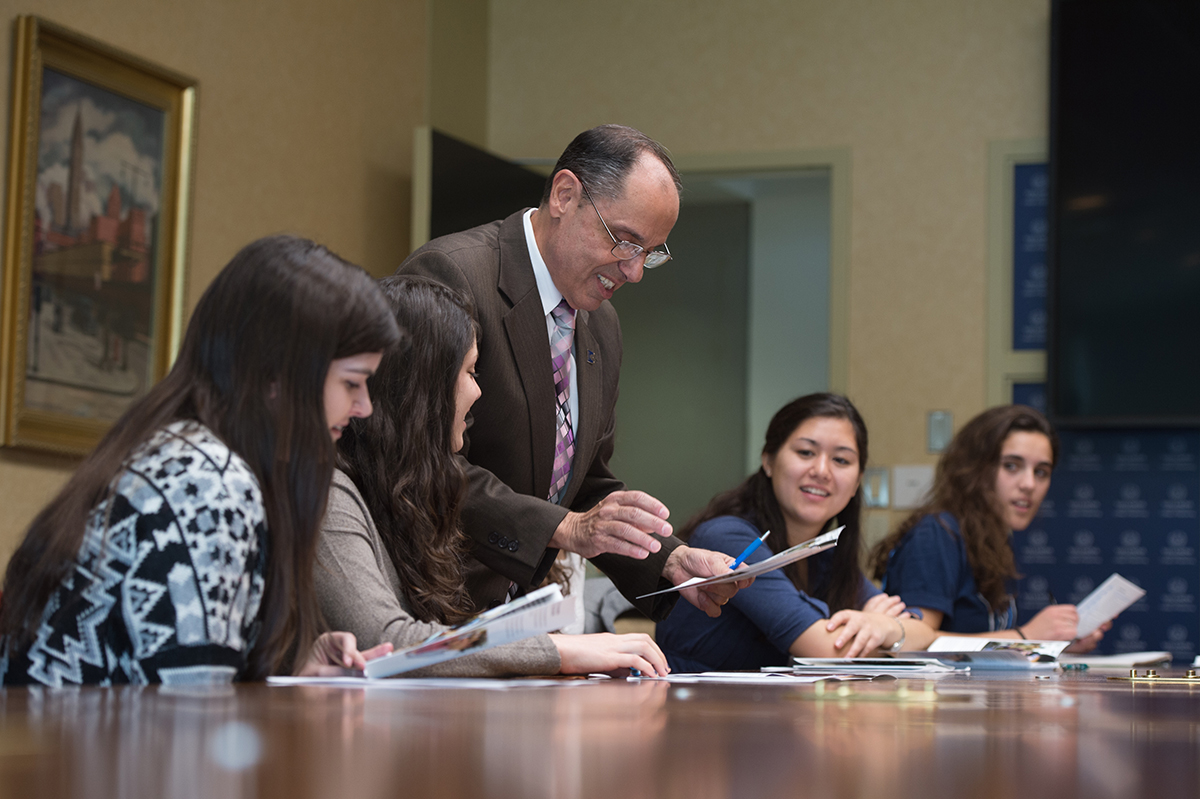Career Compass Recognized with 2021 ABET Innovation Award

In fall 2016, with the input of industry leaders, engineering alumni, faculty and students, Villanova University’s College of Engineering launched Career Compass, a required, credit-bearing professional development program for undergraduates. Recognizing that engineering graduates are no longer needed to perform routine assignments that can be accomplished by trained technicians or advanced computerized systems, Career Compass stimulates and develops the broad-based innovative, leadership and management skills being sought by today’s employers. In addition to offering specific guidance in ethical behavior, group dynamics, networking, and oral and written communication, students are given the direction they need to pursue and achieve their professional goals. As the program enters its fifth year, Frank Falcone, the College’s director of Professional Development and Experiential Education, reflects on the program’s success, as recognized by the Accreditation Board for Engineering and Technology with its 2021 Innovation Award.
“As far as I know, Career Compass is the benchmark for professional development among engineering schools,” claims Falcone. ABET appears to agree. In November 2020, it cited the program as an “institutional strength” and in June 2021 it announced Career Compass as the winner of its Innovation Award, which “recognizes vision and commitment that challenge the status-quo in technical education.”
Eager to share lessons learned from the program’s development and continual improvements, Falcone has served as a founding member of the “Closing the Gap Initiative” in the Engineering & Construction Contractors (ECC) Association. He provided a comprehensive overview of Career Compass at the ASEE Middle Atlantic Section conference in April 2021 and shared the program’s ethics course content in talks given to the Philadelphia Engineers’ Club and American Institute for Chemical Engineers Delaware Valley Section. Given Falcone’s passion for the professional development of engineering students, the College is pursuing a grant from the United Engineering Foundation, which, if successful, will support the development of workshops to enable other schools to adopt the Career Compass framework on their campuses. In recognition of his tireless dedication and impressive contributions to the field of engineering education, Falcone received the 2021 Delaware Valley Engineers Week Outstanding Service to Engineering Award.
When providing others with an introduction to Career Compass, there are a number of aspects that Falcone is certain to highlight, from its self-directed structure with content delivered through online videos, professional events/presentations and in-person workshops to its emphasis on career planning and preparation, which are bolstered by a partnership with the University’s Career Center. What Falcone focuses most of the conversation on, however, is Career Compass’ crowning jewel: its organized and guided gender-based mentorship program. Thanks to 650 Villanova engineering alumni, Career Compass has successfully paired second- and third-year students with generous and engaged volunteers whom Falcone says, “provide real, personal and professional advice for undergraduates, which should help them define their individual career paths moving forward.”
This has been the most popular aspect of the program for students. In an anonymous post-assessment survey, one sophomore noted, “It has been helpful to learn from someone who was once in my shoes and had to figure out their career path as well.” Another student wrote, “Often in my conversations with my mentor we got onto subjects that I didn't even know I had questions about, but in hearing full, human stories of actual experiences, it sparked conversations about some of the smallest details about professional life that might arguably have the most impact.”
The contributions of alumni extend beyond mentorship to include a newly launched COMPASS Conversations initiative that began in fall 2020. Falcone says, “We arranged a panel discussion for each engineering major in which alumni talk about their first jobs, what they’re doing with their careers now, and how Villanova prepared them for success.” The goal of the panels is to answer for students, “What can I do with my major?” Though attendance is not required, COMPASS Conversations was highly successful, attracting 27 alumni participants and nearly 250 students. Falcone intends to maintain the virtual format necessitated by the pandemic. “It offers the advantage of greater geographic, gender and racial diversity.”
This past academic year also brought students and alumni together virtually through “Book Ends,” a new discussion opportunity suggested by Engineering Alumni Society Vice President and Career Compass advisory board member Adrienne Donaghue '11 CE, '13 MSWREE. In spring 2021, participants read Give and Take: A Revolutionary Approach to Success by Adam Grant. New titles are now being considered for 2022.
These programs and others are hitting the mark with students. A first-year Civil Engineering major wrote, “The Career Compass events I attended broadened my knowledge in areas of engineering I never would've looked into or even learned from a course at Villanova.” A Chemical Engineering freshman found, “The Career Compass program is a good way for engineers to get a head start on professionalism, explore resources available to engineers at Villanova, and consider their options.”
Despite all that has been accomplished in the program’s first five years, Falcone is not content to rest on his laurels. “To measure progress, we partner with Villanova’s Office of Strategic Planning and Institutional Effectiveness to develop and administer pre-assessment and post-assessment surveys,” which he says, are utilized to further the program. Based on those survey results, these are among pending improvements:
- Utilizing an interview format for more of the future videos instead of the standard lecture format.
- Developing an in-person structure, establishing one defined time slot per week during each semester for Career Compass academics and activities.
- Establishing a “Post-Internship Program” through which upperclassmen can share internship experiences with freshmen and sophomores.
Additionally, Falcone reports that the 2021-22 academic year will introduce three new Career Compass modules: Professional Etiquette (with a focus on email communication), Leadership / Management, and Universal Design.
“The student survey results are really encouraging,” says Falcone. “They have consistently improved since the first year of the program, and we look forward to continuing to build on Career Compass’ success.”
